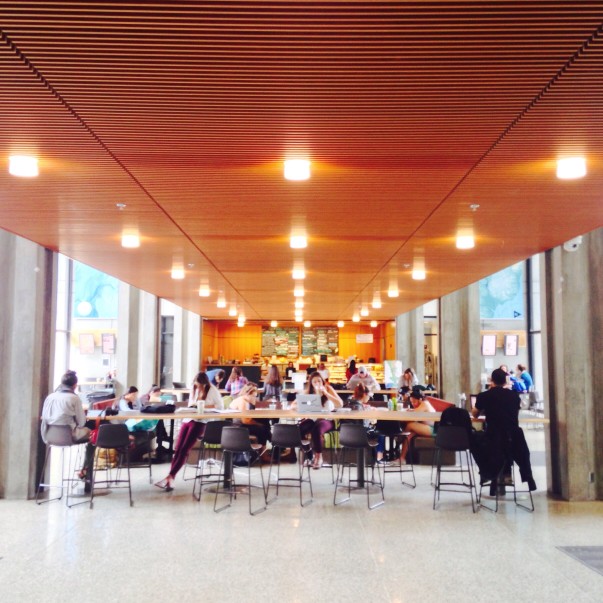Tocqueville would be appalled at our modern political discourse. The left wants to centralize power in the State to enforce an economically “just” society. Many on right want to centralize power to enforce a particular view of moral society. And those of the libertarian tradition are not sure what this “society” thing is.
The conversation missing from this picture regards the one sphere of life where nearly everything that matters takes place: the community. Specifically, I want to draw attention to the intermediate associations between the individual and the State, the erosion of which is dramatically reshaping our culture, economics and politics for the worse.
The Four Keys To Happiness
Taking stage before a group of undergraduates and professors at a recent Values & Capitalism conference, AEI president Arthur Brooks shared what the consensus of social science suggests are the keys to happiness. It’s true that money does not buy happiness—at least not for very long. The true substance of life remains either in a healthy or unhealthy condition, and one cannot spend one’s way out of it.
So what is it that makes up that substance, according to Dr. Brooks? What we have always known intuitively, and now research confirms, is that there are four keys to a happy life:
- Faith (take it seriously)
- Family (get married, stay married, raise children)
- Community (be involved, join groups, visit friends)
- Work (find a meaningful way to serve others and earn a living)
Self-professed agnostic social scientist Charles Murray echoes this in his own findings. In a forthcoming book for Values & Capitalism—and in his widely praised “Coming Apart”—Murray identifies four strikingly similar “founding virtues,” as he calls them, which contribute significantly to both a happy and economically successful life:
- Religiosity
- Marriage
- Honesty
- Industriousness
Murray tracks the changes in these virtues among low-income Americans since the 1960s and finds that the gradual but severe decay of these social institutions has had a profound impact on socioeconomic mobility. Individuals who have rejected traditional norms are significantly worse off on nearly every measure of success. He argues that the prevalence of these virtues among all classes is what made America exceptional, but that we are quickly losing ground.
What is it about things like faith, work and family that make people so happy?
While delivering a lecture at the Acton Institute,Dr. Brian Fikkert turned the common definition of poverty—a materialistic notion—on its head: “Poverty,” Fikkert argues, “is fundamentally rooted in
broken relationships.” These include one’s relationship to family, friends, community, God and even
things. When we lack a healthy sense of stewardship over our lives, we become dependent on the environment and people around us. Material poverty can be an outward symptom of a severed connection between one’s God-given purpose and one’s present state. When we try to repair the outward symptoms of poverty without recognizing the inner source, we risk making matters worse.
We Are Not Alone
Aristotle noted that humans are “political animals,” by which he meant we are naturally relational. Indeed, our relational ties to the world are multi-faceted the moment we are born.
Libertarians rightly note that every individual must confront the force of his or her own conscience and convictions. When all is in doubt, Decartes famous formulation still holds: “cogito ergo sum” (I think, therefore I am). So long as I have a mind and spirit, my faith can guide me forward, and in this sense, society is obligated to respect freedom of conscience and religion.
But we do not enter this world alone; we are members of a particular family, where the bulk of our social vices and virtues are learned. Expanding outward, individuals and families are also embedded as members of a community, made up of various associations, from churches, meetings and markets to Robert Putnam’s bowling leagues.
We are also citizens of a political society operating under a particular framework of power relationships—ideally for the purpose of arresting evil. And lastly, as Christians we are citizens of a holy Kingdom, which demands that we also see those around the world as brothers and sisters of a certain nature.
Life Between The Person And The State
What does this all mean as we seek the keys to happiness and human flourishing?
It means that the role you play among the people you see every day is more important that who won an election or how the Supreme Court ruled on a major issue. It means that it is much more important to ask whether or not someone is living out the fullness of their purpose—regardless of how broad or narrow—than to ask which economic class they belong to. It means that “public service” is not an office, but an attitude that one carries to work, to school and most importantly at home.
The key to human flourishing is to see society as neither a group of isolated individuals nor a perfectible collective; rather, we must view the social organism as one made of thinking, acting individuals who are valuable contributors to their immediate, local, civic and ecclesiastical families. This suggests not a top-down approach to political and economic problems, but a
voluntary and
interdependent approach.
The most important lessons in life are not learned in the classroom, and they rarely sink in from the pulpit. No, we learn to live on the playground, in the PTA meeting and through neighborhood food-drives. It is the mundane and unexpected places that provide our greatest opportunities to truly live and love.
None of this is to suggest that politics is not important: We must work to protect these intermediate spheres of life from becoming subject to the will and caprice of a detached authority. Ironically, by centralizing our laws and nationalizing our associations, we achieve the appearance of unity, but erode the ties that truly bind us.
]]>



